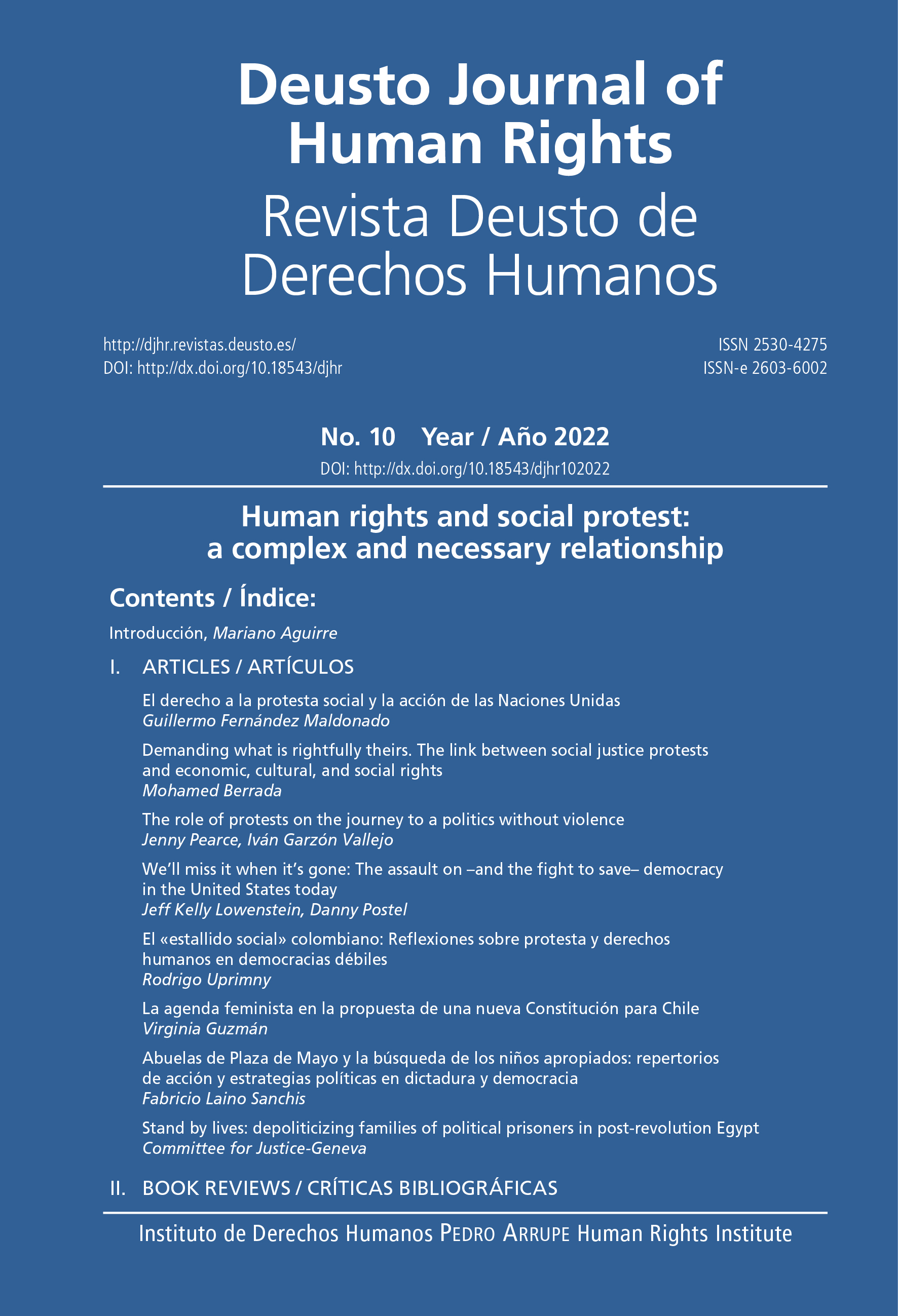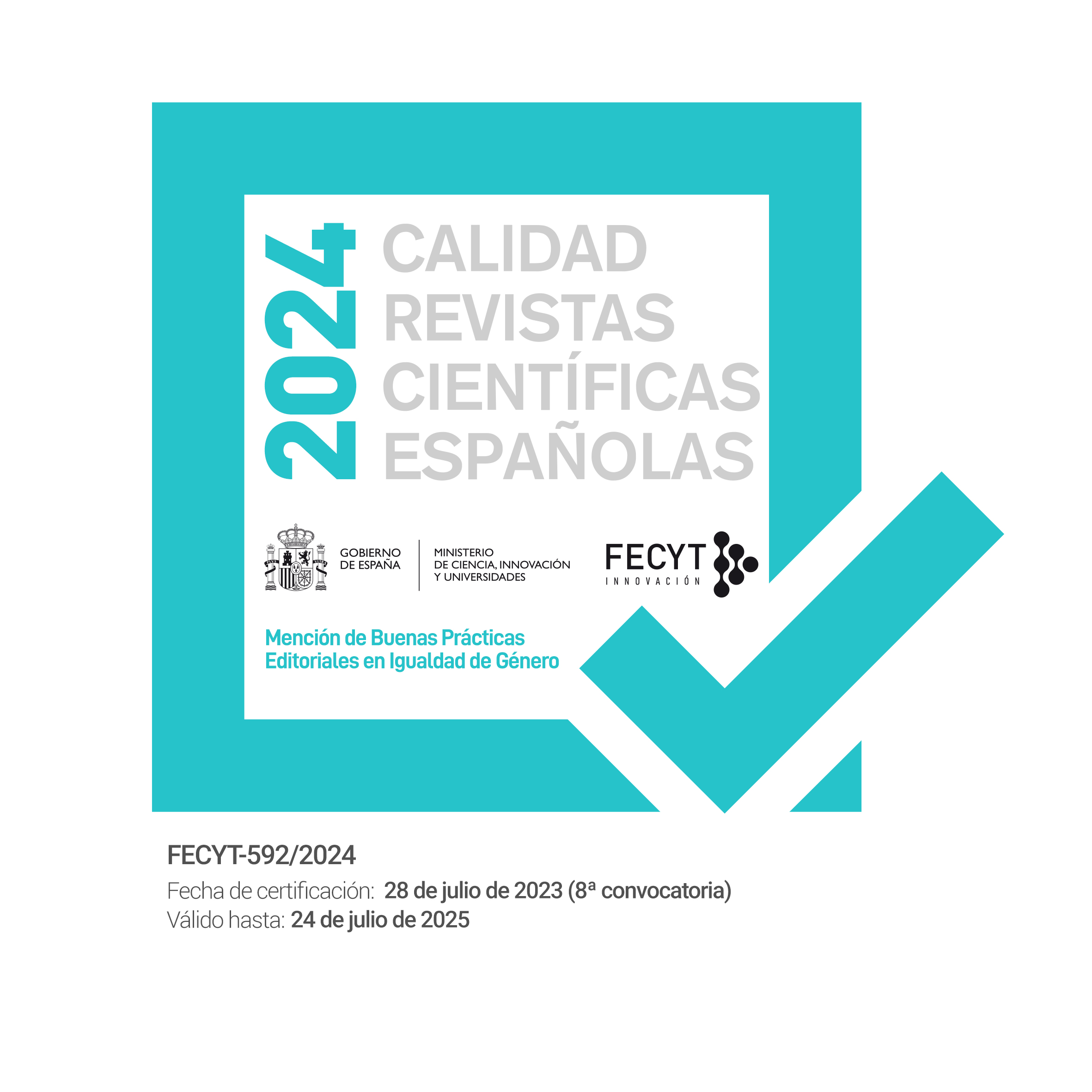Stand by lives: depoliticizing families of political prisoners in post-revolution Egypt
Abstract
Since 2017, Committee for Justice has been working on monitoring and verifying human rights violations inside Egyptian prisons and places of detention under its project «Detention Watch». Based on findings of in-depth interviews with 10 relatives of political prisoners during March and September 2022, this article presents the cases of families who are active and inactive social and economic agents representing different groups of the Egyptian population. It focuses on the impact of human rights violations on depoliticizing relatives of political prisoners –wives, parents, and children– and how this affected their efforts to over the economic hardship, as well as their attitudes regarding migration, protesting, and political reconciliation with the regime. In doing so, the article mires to explore the personal, economic, social, and political results of repression and how these have led to increased depoliticization among individuals who are affected indirectly by human rights violations.
Received: 20 May 2022
Accepted: 16 November 2022
Downloads
References
Abdelrahman, Maha. 2014. Egypt’s Long Revolution: Protest Movements and Uprisings (1st ed.). London: Routledge. https://doi.org/10.4324/9781315762265
Allam, Nermin. 2015. «What Holds Next? The Politics of Disappointment,» The London School of Economics and Political Science Middle East Centre (blog). http://blogs.lse.ac.uk/mec/2015/08/11/what-holds-next-the-politics-of-disappointment/
Allam, Nermin. 2018. «Activism Amid Disappointment: Women’s Groups and the Politics of Hope in Egypt.» Middle East Law and Governance 10, no. 3: 291-316. https://doi.org/10.1163/18763375-01003004
BenEzir G. 2009. «Trauma signals in life stories». In Trauma: Life Stories of Survivors, 29-44. Edited by With Graham, Kim L. Rogers and Selma Leydesdorff. New Brunswick, NJ: Transaction Publishers.
Caracciolo, Giorgio, Ergun Cakal, the Committee for Justice, and Egyptian Commission for Rights and Freedoms. 2021. Torture in Egypt: Systemic and Systematic. Dignity publication series on torture and organised violence, praxis paper 38. Accessed 24 January 2022: https://www.dignity.dk/wp-content/uploads/publication-series-38.pdf
Committee for Justice. 2020a. Slow Death: Violations in Egyptian Places of Detention. Annual report 2019. Accessed 24 January 2022: https://www.cfjustice.org/slow-death/
Committee for Justice. 2020b. The Giulio Regenis of Egypt: Deaths in custody in Egypt since 2013. Accessed 24 January 2022: https://www.cfjustice.org/the-giulio-regenis-of-egypt-deaths-in-custody-in-egypt-since-2013/
Committee for Justice. 2020c. Renewed Arbitrary Detention: Special Report on May/June 2020. Accessed 24 January 2022: https://www.cfjustice.org/renewed-arbitrary-detention/
Committee for Justice. 2021a. How repression in custody intensified in the era of Covid-19: Annual report 2020. Accessed 24 January 2022: https://www.cfjustice.org/annual-report-egypt-in-2020-was-torn-between-intensified-repression-and-the-covid-19-pandemic/
Committee for Justice. 2021b. We decided to close the investigation: biannual report January-June 2021. Accessed 24 January 2022: https://www.cfjustice.org/we-decided-to-close-the-investigation/
Committee for Justice. 2021c. Egypt’s execution frenzy: 2ed quarterly report April-June 2021. Accessed 7 February 2022: https://www.cfjustice.org/egypts-executions-frenzy-continues-in-second-quarter-of-2021/
Committee for Justice. 2022a. Conviction without trial: Trial Watch annual report 2021. Accessed 24 January 2022: https://www.cfjustice.org/conviction-without-trial/
Committee for Justice. 2022b. Egyptian Prisons: rehabilitation centres or graves for human rights. Accessed 7 February 2022: https://www.cfjustice.org/egyptian-prisons-rehabilitation-centres-or-graves-for-human-rights/
Committee for Justice. 2022c. Rawabet we Tajammou’at zawy al-dahaya bi Misr wa kayfa asbahat juz’an fa’ilan men al-hirak al-siyasi [Networks and gatherings of victims’ families in Egypt and how they became an active part of the political and human rights movement.] Accessed 7 February 2022: https://bit.ly/3TmRSst
Department of State. 2021. «Egypt 2021 Human Rights Report.» Country report: Egypt. Accessed 26 January 2022: https://www.state.gov/wp-content/uploads/2022/03/313615_EGYPT-2021-HUMAN-RIGHTS-REPORT.pdf
Durac, Vincent. 2013. «Protest movements and political change: an analysis of the ‘Arab uprisings’ of 2011», Journal of Contemporary African Studies 31, no. 2: 175-193. DOI: https://doi.org/10.1080/02589001.2013.783754
Elsayed, Ahmed, and Olivier Marie. 2019. «Less school (costs), more (female) education? Lessons from Egypt reducting years of compulsory schooling.» IZA Institute of Labor Economics. 1-65. Accessed 7 February 2022: https://docs.iza.org/dp13402.pdf
Ezzat, Ahmed. 2014. «‘You are being watched!’ Egypt’s mass internet surveillance». Mada Masr. Accessed 7 February 2022: http://www.madamasr.com/node/9001
Freedom House Egypt. 2022. «Rights Defender’s Imprisoned Father at Risk». Joint Statement. 16 February. Accessed 7 February 2022: https://freedomhouse.org/article/egypt-rights-defenders-imprisoned-father-risk
Gould, Deborah B. 2009. Moving politics: Emotion and ACT UP’s fight against AIDS. Chicago: University of Chicago Press.
Greenberg, Jessica. 2011. «On the Road to Normal: Negotiating Agency and State Sovereignty in Postsocialist Serbia.» American Anthropologist 113, no. 1: 88-100. Accessed 24 January 2022: http://www.jstor.org/stable/41407378
Greenberg, Jessica. 2014. After the revolution: Youth, democracy, and the politics of disappointment in Serbia. Redwood: Stanford University Press.
Human Rights Watch. 2019. Egypt: Families of Dissidents Targeted: Relatives of Critics Abroad face home raids, Arrests, travel Bans.19 November. Accessed 24 January 2022: https://www.hrw.org/news/2019/11/19/egypt-families-dissidents-targeted
Kienle, Eberhard and Nadine Sika, eds. 2015. The Arab Uprisings: transforming and challenging state power. London: IB Tauris.
Korani, Bahgat and Rabab El-Mahdi, eds. 2012. Arab Spring in Egypt: Revolution and Beyond (A Tahrir Studies Edition). American University in Cairo Press. https://doi.org/10.5743/cairo/9789774165368.001.0001
Matthies-Boon, Vivienne, and Naomi Head. 2018. «Trauma as Counter-Revolutionary Colonisation: Narratives from (Post)Revolutionary Egypt.» Journal of International Political Theory 14, no. 3: 258-79. Accessed 24 January 2022: https://doi.org/10.1177/1755088217748970 .
Meijer, Roel, ed. 2013. Alienation or integration of Arab Youth. Between family, state and street, London: Routledge.
Meringolo, Azzurra. 2015. «The Struggle over the Egyptian Public Sphere», IAI Working Papers 15, no. 04. Accessed 24 January 2022: https://www.iai.it/en/pubblicazioni/struggle-over-egyptian-public-sphere .
Mirshak, Nadim. 2019. «Rethinking resistance under authoritarianism: civil society and non-contentious forms of contestation in post-uprisings Egypt», Social Movement Studies 18, no. 6: 702-719. DOI: https://doi.org/10.1080/14742837.2019.1627865
Nagah, Hussein. 2014. «The Crisis of Egypt’s Youth». Fikra Forum, Accessed 24 January 2022: http://fikraforum.org/?p=6153 .
OHCHR. 2020. Press Briefing Note on Egypt. 3 April. Accessed 24 January 2022: https://www.ohchr.org/en/press-briefing-notes/2020/04/press-briefing-note-egypt
Pearlman, Wendy. 2013. «Emotions and the Microfoundations of the Arab Uprisings.» Perspectives on Politics 11, no. 2: 387-409. DOI: https://doi.org/10.1017/S1537592713001072
Ryan, Louise. 2015. «Friendship-making: Exploring network formations through the narratives of Irish highly qualified migrants in Britain.» Journal of Ethnic and Migration Studies 41, no. 10: 1664-1683.
Rosenzweig, Mark R., and T. Paul Schultz. 1982. «Market opportunities, genetic endowments, and intrafamily resource distribution: Child survival in Rural India.» American Economic Review 72, no. 4: 803-815. Accessed 24 January 2022: http://www.jstor.org/stable/1810018 .
Sika, Nadine. 2016a. «Youth civic and political engagement in Egypt.» Power2Youth, Working paper 18. Accessed 24 January 2022: https://www.academia.edu/28879909/Youth_Civic_and_Political_Engagement_in_Egypt
Sika, Nadine. 2016b. «Ambiguities of student activism, authoritarianism and democratic attitudes: the cases of Egypt and Morocco.» The Journal of North African Studies. DOI: https://doi.org/10.1080/13629387.2016.1229183
Sika, Nadine. 2017. Youth Activism and Contentious Politics in Egypt: Dynamics of Continuity and Change. Cambridge: Cambridge University Press.
Sztompka, Piotr. 2000. «Cultural trauma: The other face of social change.» European Journal of Social Theory 3, no. 4: 449-466. https://doi.org/10.1177/136843100003004004
Tuccio, Michele, Jackline Wahba, and Bachir Hamdouch. 2019. «International migration as a driver of political and social change: evidence from Morocco.» Journal of Population Economy 32: 1171-1203. https://doi.org/10.1007/s00148-019-00734-9
Vairel, Frédéric. 2013. «Protesting in Authoritarian Situations. Egypt and Morocco in Comparative Perspective». In Movements, Mobilization, and Contestation in the Middle East and North Africa, edited by Joel Beinin and Frédéric Vairel, 2nd ed., 33-48. Stanford. Stanford University Press.
Deusto Journal of Human Rights / Revista Deusto de Derechos Humanos is an Open Access journal; which means that it is free for full and immediate access, reading, search, download, distribution, and reuse in any medium only for non-commercial purposes and in accordance with any applicable copyright legislation, without prior permission from the copyright holder (University of Deusto) or the author; provided the original work and publication source are properly cited (Issue number, year, pages and DOI if applicable) and any changes to the original are clearly indicated. Any other use of its content in any medium or format, now known or developed in the future, requires prior written permission of the copyright holder.



3.jpg)
3.jpg)
3.jpg)
.jpg)








